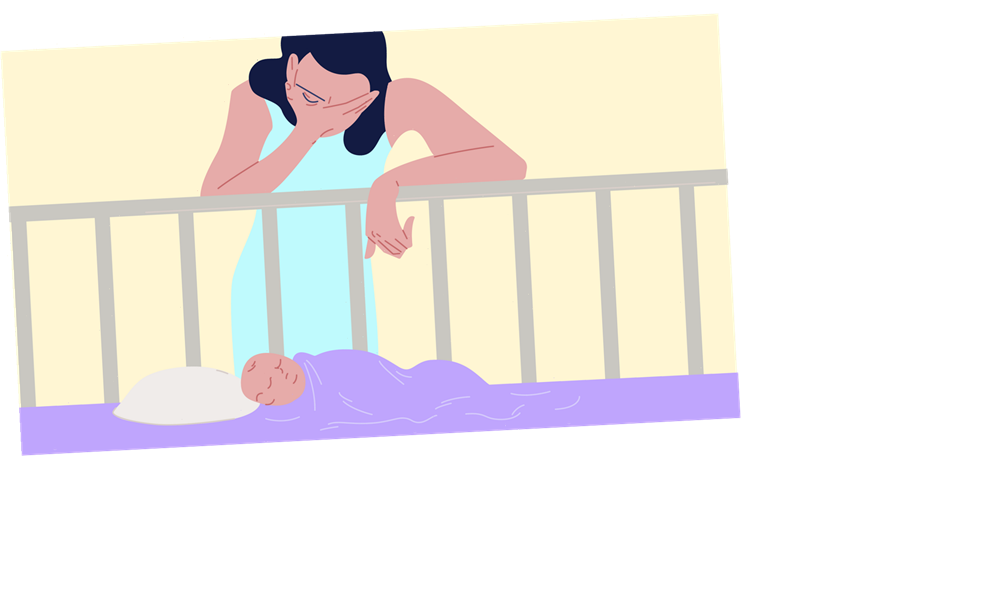Sleep and lack thereof are hot topics when you have your first baby. It’s not like any new parent is exactly surprised when they find that they have to get up a million times a night to care for their newborn. But not many people actually discuss something else that might be turning moms into the walking dead during the daytime hours — even when their babies manage to sleep or partners take on some midnight feedings: postpartum insomnia.
So there you are, lying in your bed, in a finally quiet house, exhausted beyond belief, and all you can do is listen to the rasping sounds of your newborn’s snoring. Does that breathing sound right? Did you swaddle her right? He’s going to wake up again any minute now, so why bother falling asleep? Why didn’t she poop at all today? What am I going to do when I have to go back to work? Why am I not sleeping right now?
It is the most ironic of experiences. And while sleep specialists know it exists and treat it, they don’t really know how common postpartum insomnia is, because new parents don’t usually go to their doctors with sleep problems, assuming that this is all part and parcel of having a baby. But if you can’t fall asleep within 30 minutes of going to be, find yourself waking up multiple time a night (without the help of your baby’s cries), wake up earlier in the morning than you’d like, and/or feel tired despite having slept for at least seven hours, you might have textbook insomnia, says Dr. Shalini Paruthi, co-director of the Sleep Medicine and Research Center at St. Luke’s Hospital in St. Louis.
Why now?
“Major changes can trigger the insomnia,” Paruthi told SheKnows. “Having a baby is a major life change in terms of environment and in terms of hormones.”
Just as women experience changes in their sleep patterns during their periods, while pregnant, and during menopause, their sleep gets scrambled by the rapid drop in their hormone levels after childbirth. (Isn’t it fun being female?) Plus, of course, there’s anxiety over this new little creature that just came out of you.
“There’s always the worries about everything, because now you’ve got a new little human that we want to provide the utmost care for,” Paruthi said.
Sleep every chance you get
Funny enough, the baby waking up every two hours during this time can actually help some women to sleep more soundly, Paruthi said. One of the common treatments for insomnia is something called “sleep restriction,” in which the patient actually goes to bed for fewer hours.
“The brain is very savvy, and if it is not getting enough sleep and it sees the opportunity to get good, safe sleep, the brain will take advantage of that,” Paruthi explained.
This is also why it is possible for moms to catch up on their sleep while the baby naps during the day. Even if they weren’t into napping before, their brains will seek out this restorative time at any opportunity. So yeah, “sleep when the baby sleeps” is a real, medically advised thing.
What you can do: Sleep hygiene & beyond
In addition to feeling like you can’t fall back asleep easily at night or during the day, a real indication that you have insomnia is your ability to function during the day. If this is the case for you, Paruthi suggests that you begin to log your sleep, to see how many hours you’re really getting and whether there are any triggers for their sleeplessness (since diet and caffeine intake are also factors).
Just as new moms can develop bedtime routines for their babies (yes, even newborns), they can be doing so for themselves too. That means turning off the screens an hour before bed, and then the same basic activities every night.
“The important part is you’re still going through those activities in the exact same order, so your brain has that opportunity to transition from ‘go, go, go, go, go!’ to ‘I need to relax’ and be ready to transition to sleep,” Paruthi said.
Studies have also shown that meditation can help improve insomnia, so if you don’t already have a practice, this might be a good time to download one of the meditation apps we’re always talking about.
You might also not be able to tell whether these methods really help because with most women, postpartum insomnia begins to subside by the time the baby is about 12 weeks old.
When to seek medical help
“If insomnia really starts to affect that daytime function, that’s when you really want to seek the help of your OB or primary care doctor,” Paruthi said. “Because new moms’ sleep is incredibly important to their daytime function, which will be how they provide care for their newborn.”
While everyone else might feel like this is a good time to pop an over-the-counter sleep aid, breastfeeding moms can’t risk this without medical advice because most of those meds can come out in their milk. If you’re not breastfeeding, Paruthi said a doctor might start the patient out on a low dose to make sure they’d still be able to wake up to care for the baby if needed.
As healthy as breastfeeding is for the baby, so is having a well-rested mother. Studies have shown a relationship between poor postpartum sleep and poor maternal-infant attachment. Lack of sleep is also related to postpartum depression — and it’s difficult to parse out which one causes the other. This is why it’s important to have an honest conversation with a health-care provider about what to do that has the best possible outcome for both of you.
Maybe this dreamy nursery decor will get both you and your baby sleeping soundly.
Source: Read Full Article





